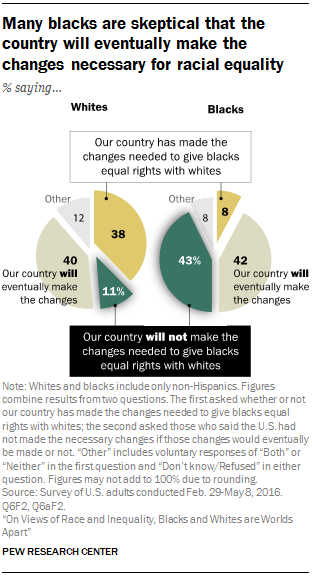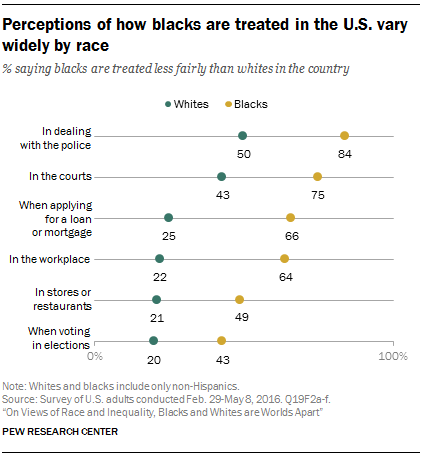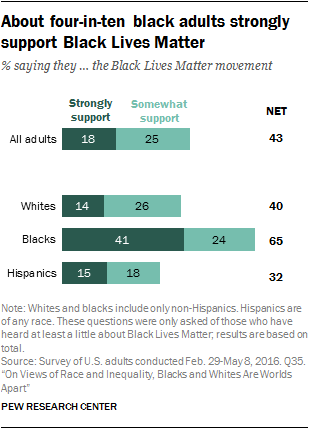A new Pew Research Center survey finds profound differences between black and white Americans in how they view the current state of race relations and racial equality and in the ways they experience day-to-day life.
Here are five key takeaways from the new report on race in America:

Whites and blacks are split over the current state of race relations and what progress Obama has made on the issue. About six-in-ten blacks (61%) say race relations are generally bad, while about equal shares of whites say race relations are good as say they’re bad. Overall views on race relations are more positive now than they were a year ago, following the unrest in Baltimore over the death of Freddie Gray, a black man who died while in police custody. Even so, the public’s views of race relations are more negative now than they have been for much of the 2000s.
Following the election of Barack Obama as the nation’s first black president in 2008, many voters were optimistic that his election would lead to better race relations. Today, about a third of Americans (34%) say Obama has made progress on improving race relations, while about three-in-ten (28%) say he has tried but failed to make progress. A quarter say the president has made race relations worse and 8% say he has not addressed race relations. Blacks are far more likely than whites or Hispanics to say Obama has made progress on race relations (51% vs. 28% and 38%, respectively). Among whites, Republicans are particularly likely to say the president has made race relations worse: 63% of white Republicans say this is the case.

About six-in-ten Americans (61%) say more changes are needed to achieve racial equality; 30% say the country has already made enough changes. There’s a big race gap on this question: 88% of blacks and seven-in-ten Hispanics say more changes are needed for blacks to have equal rights with whites compared with 53% of whites. Some 38% of whites say the necessary changes have been made.
About four-in-ten blacks (43%) are doubtful that the country will ever make the changes needed for blacks to have equal rights with whites. Just 11% of whites and 17% of Hispanics share this view.

By large margins, black adults are more likely than whites to say that blacks are treated less fairly than whites across key areas of American life. For example, 64% of black adults say blacks are treated less fairly than whites in the workplace, compared with 22% of whites who say the same – a 42-percentage-point gap. Blacks are also considerably more likely than whites – by margins of at least 20 points – to say that blacks are treated less fairly than whites in dealing with the police, in the courts, when applying for a loan or mortgage, in stores and restaurants and when voting in elections.
Blacks are also more likely than whites to say they have experienced unfair treatment because of their race or ethnicity in the past year. Some 47% of blacks say someone has acted as if they were suspicious of them and 45% say people have acted as if they thought they weren’t smart. About one-in-ten whites report having these types of experiences. Blacks are also more likely than whites to say they have been unfairly stopped by police (18% vs. 3%) and that they have been treated unfairly in hiring, pay or a job promotion (21% vs. 4%) in the last year.

About four-in-ten Americans express support for the Black Lives Matter movement, but blacks are considerably more likely to do so than whites or Hispanics. About two-thirds of blacks (65%) say they strongly or somewhat support the movement, compared with 40% of whites and 32% of Hispanics.
Among whites, Democrats and those younger than 30 are more likely than others to say they support the Black Lives Matter movement. Fully 64% of white Democrats express support for the movement – roughly equal to the share of black Democrats (65%). By comparison, 20% of white Republicans and 42% of white independents say they support it.
Similarly, six-in-ten white adults younger than 30 express at least some support for the Black Lives Matter movement, compared with fewer than half of whites who are 30 or older.
Among blacks, there is stronger support for Black Lives Matter from those younger than 50: Roughly half of blacks ages 18 to 29 (52%) and 30 to 49 (47%) strongly support the movement, compared with 32% of blacks ages 50 to 64 and 26% of blacks ages 65 and older.

Across several measures, black-white gaps in social and economic well-being persist. Blacks lag behind whites in homeownership, household wealth and median income, among other indicators. And these differences remain even when controlling for levels of education.
Long-standing racial differences in family structure also persist. Today, non-marital births are more than twice as common among black mothers as white mothers, and black children are nearly three times as likely as white children to be living with a single parent.